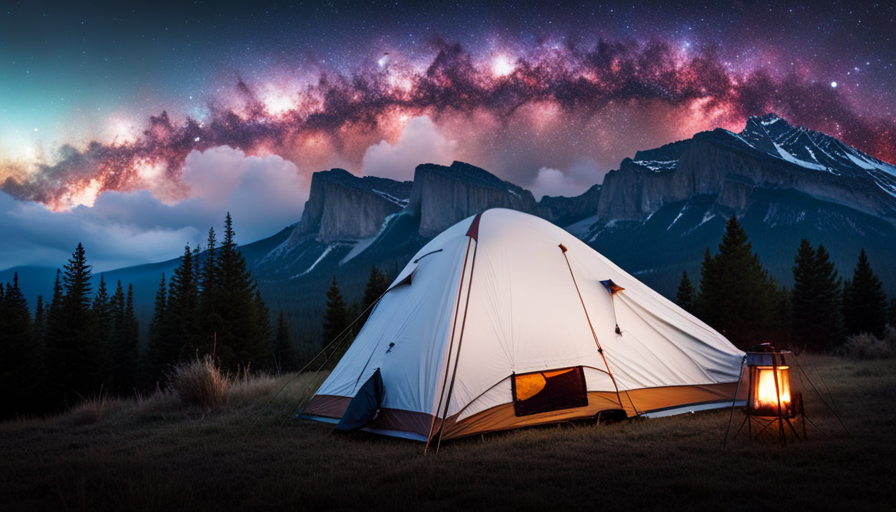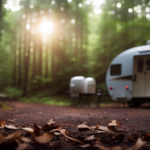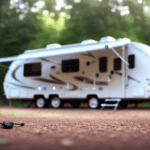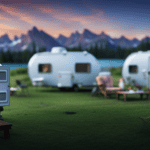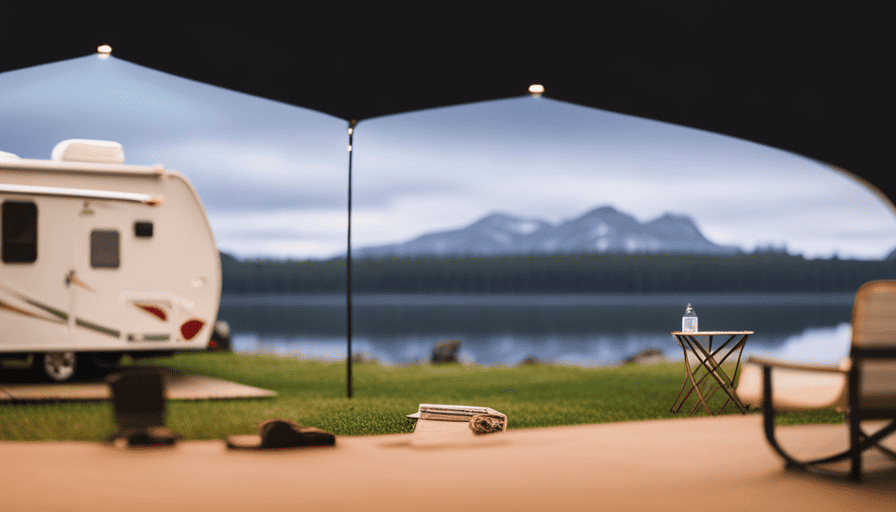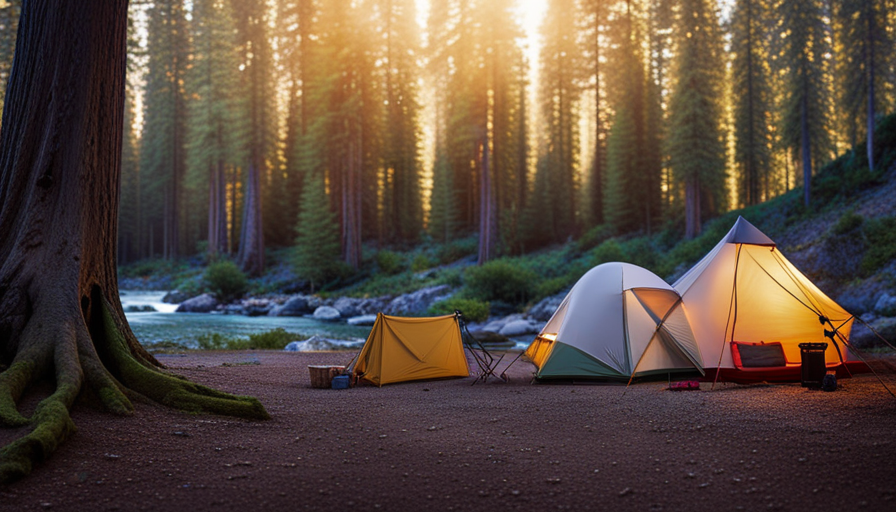Do you constantly find yourself stuck in remote areas with a camper battery that’s completely drained? Don’t worry, adventurous souls, as we have the perfect fix for your power problems! Presenting the powerful generator, designed to supply you with the necessary electricity to keep your camper functioning without any interruptions.
But here’s the thing – not all generators are created equal. Oh no, my friends, finding the right size generator for your camper is like finding a needle in a haystack. It requires careful calculation, consideration of your power needs, and a thorough understanding of the appliances and electronics you’ll be using.
Lucky for you, we’re here to guide you through this process step by step. So strap in, fellow campers, and get ready to embark on a journey to generator enlightenment!
Key Takeaways
- Assess power needs before selecting a generator
- Choose the right size generator based on total wattage requirement
- Consider factors such as fuel type, fuel efficiency, and noise levels
- Balance power needs and budget when choosing a camping generator
Assess Your Power Needs
Figure out how much power you’ll require to ensure your camping trip is stress-free and enjoyable. When it comes to choosing the right generator for your camper, it’s essential to assess your power needs.
Start by considering the portable generator options available to you. These generators come in various sizes and power outputs, so it’s crucial to select one that matches your requirements. Additionally, keep in mind generator maintenance tips to ensure its longevity and optimal performance.
To determine the size of the generator you need, begin by creating a list of all the appliances and electronics you’ll use while camping. Consider everything from your refrigerator and air conditioner to smaller devices like laptops and smartphones. Make note of the power ratings or wattage requirements for each item.
By adding up these figures, you can get an estimate of the total power you’ll need. Once you have this information, you can confidently choose a generator that meets your power needs.
Remember, it’s always better to have a generator with slightly more power than you think you’ll require, as it allows for any unexpected power surges or additional devices. With the right generator in place, you can ensure a comfortable camping experience without worrying about running out of power.
Determine the Appliances and Electronics You Will Use
Consider the appliances and electronics you’ll use in your camper, as they can consume up to 25% of your power supply, making it crucial to plan accordingly. To determine the appropriate generator size, you need to assess the power consumption of your appliances and electronics.
Here are some key factors to consider:
-
Power consumption: Each appliance or electronic device has a specific power requirement, measured in watts. Make a list of all the items you plan to use in your camper, including lights, refrigerator, microwave, air conditioner, TV, and charging devices.
-
Electrical load: Calculate the total wattage requirement by adding up the power consumption of each item. Consider peak power demands, such as when the air conditioner or microwave is running simultaneously with other devices. Remember that some appliances may have a higher start-up power requirement.
-
Prioritize: Determine which appliances are essential and which ones you can live without. This will help you prioritize your power usage and ensure that you have enough capacity for the essentials.
By considering the power consumption and electrical load of your appliances and electronics, you can determine the size of the generator needed to meet your camper’s power requirements.
Next, we will discuss how to calculate the total wattage requirement to further assist you in selecting the right generator.
Calculate the Total Wattage Requirement
To accurately determine the total wattage requirement for your appliances and electronics, you’ll need to assess the power consumption of each item. This includes taking into account any peak power demands that may occur when multiple devices are running simultaneously.
Start by listing all the appliances and electronics you plan to use in your camper. Look for the wattage rating of each item, which can usually be found on a label or in the user manual. Add up the wattage of all the devices to get the total wattage requirement.
Keep in mind that some appliances may have different power consumption levels depending on whether they are running at their peak or normal operating capacity.
When calculating power consumption, it’s important to consider the starting watts vs. running watts of your appliances and electronics. Starting watts refer to the extra power needed to start up certain devices, like air conditioners or refrigerators, while running watts indicate the power needed to keep them running. This distinction is important because the starting watts can be significantly higher than the running watts.
By determining the generator capacity needed to handle the peak power demands, you can ensure that your camper’s power needs are met.
Consider the Starting Watts vs. Running Watts
Understanding the difference between starting watts and running watts is crucial in determining the power requirements for your appliances and electronics in the camper. Here are three key points to consider:
-
Starting Watts vs. Running Watts: Starting watts refer to the initial surge of power needed when an appliance or electronic device is turned on. This surge is usually higher than the power required to keep the device running, known as running watts. For example, a refrigerator may require 800 starting watts but only 200 running watts. It’s important to account for these starting watts when calculating the total wattage requirement for your camper.
-
Pros and Cons of Inverter Generators: Inverter generators are a popular choice for campers due to their efficient and reliable power output. They provide clean and stable electricity, making them suitable for sensitive electronics. One advantage of inverter generators is their ability to adjust the engine speed according to the power demand, resulting in quieter operation and better fuel efficiency. However, they’re generally more expensive than conventional generators.
-
Transition to Subsequent Section: Understanding the difference between starting watts and running watts and considering the pros and cons of inverter generators is essential when choosing the right generator type for your camper. Next, we’ll explore the options of inverter generators versus conventional generators to help you make an informed decision.
Choose the Right Generator Type (Inverter vs. Conventional)
Make sure you’re prepared for the power needs of your camper by choosing the right generator type – it’s time to dive into the differences between inverter and conventional generators.
When it comes to inverter vs. conventional generators, there are pros and cons to consider.
Inverter generators are known for their clean and stable power output, making them ideal for sensitive electronics like laptops and smartphones. They are also more fuel-efficient and quieter compared to conventional generators. Additionally, inverter generators have the ability to adjust their engine speed based on the power demand, resulting in better fuel economy and reduced noise levels.
On the other hand, conventional generators are typically more affordable and provide higher power output. They are suitable for running multiple appliances and larger equipment. However, they may produce less stable power, which can be problematic for sensitive electronics. Conventional generators also tend to be louder and less fuel-efficient compared to inverter generators.
Factors to consider when choosing a generator for camping include the power requirements of your camper, the duration of your camping trips, and the noise regulations at your camping site.
With this understanding of inverter vs. conventional generators, let’s move on to determining the fuel type (gasoline, propane, diesel) that best suits your camping needs.
Determine the Fuel Type (Gasoline, Propane, Diesel)
Now let’s delve into deciding which fuel type (gasoline, propane, diesel) will best suit your camping needs. When it comes to powering your camper, it’s important to consider fuel efficiency, as this can greatly impact your overall camping experience. Let’s compare the fuel efficiency of gasoline, propane, and diesel generators.
Gasoline generators are commonly used for campers due to their availability and affordability. They offer good fuel efficiency, allowing you to power your camper for extended periods of time. However, gasoline can be less efficient than other fuel types, especially when running at high loads.
Propane generators, on the other hand, are known for their higher fuel efficiency. They burn cleaner and produce fewer emissions compared to gasoline generators. Propane is also readily available at most camping sites, making it a convenient option. However, propane generators may have a lower power output compared to gasoline or diesel generators.
Diesel generators are known for their excellent fuel efficiency, making them a popular choice among campers. They can provide a longer run-time per gallon of fuel compared to gasoline or propane generators. Diesel is also more widely available at gas stations, ensuring you have a constant fuel supply during your camping trips.
Each fuel type has its pros and cons, so it’s important to consider your specific camping needs.
Now, let’s transition into the next section where we will discuss the importance of considering noise levels and emissions when choosing a generator for your camper.
Consider Noise Levels and Emissions
When choosing the best fuel type for your camping needs, it’s important to take into consideration the noise levels and emissions of different options.
Noise pollution can be a major concern when camping, as it can disrupt the peacefulness of nature and disturb both wildlife and other campers. Gasoline-powered generators tend to be the noisiest option, emitting a loud and constant hum. Propane generators, on the other hand, are generally quieter and produce less noise pollution. Diesel generators fall somewhere in between, with noise levels that can vary depending on the specific model.
In addition to noise levels, it’s crucial to consider the environmental impact of the fuel type you choose. Gasoline-powered generators tend to produce the highest emissions, contributing to air pollution and greenhouse gas emissions. Propane generators produce lower emissions compared to gasoline, making them a more environmentally friendly option. Diesel generators also generate lower emissions, but they can still have a significant impact on the environment.
When evaluating portability and storage options for your generator, it’s important to consider the noise levels and emissions in order to make an informed decision. By choosing a generator with lower noise levels and emissions, you can ensure a more enjoyable camping experience while also minimizing your environmental impact.
Evaluate Portability and Storage Options
Consider the portability and storage options available to ensure a convenient and hassle-free camping experience. When choosing a generator for your camper, it’s important to evaluate its portability options. Look for models that are compact, lightweight, and easy to transport. Some generators come with built-in handles or wheels, making it effortless to move them around your campsite.
Additionally, consider the size and shape of the generator, as well as the availability of carrying cases or bags, which can provide added convenience during transportation.
Storage solutions are also crucial when selecting a generator for your camper. Look for models that can be easily stored in your vehicle or camper without taking up too much space. Some generators are designed to be stackable, allowing for efficient storage. Others come with foldable handles or collapsible parts, making them more compact when not in use.
It’s also worth considering generators that have a dedicated storage compartment in your camper, ensuring they are safely stored and protected from the elements.
Evaluating the portability and storage options of a generator is essential for a seamless camping experience. Look for models that are compact, lightweight, and easy to transport. Consider storage solutions that allow for efficient storage in your vehicle or camper. By carefully considering these aspects, you can ensure that your generator is conveniently accessible and safely stored throughout your camping trip. As you move forward to determine your budget, keep in mind the importance of finding the right generator size for your camper.
Determine Your Budget
To make sure you’re prepared financially, it’s time to figure out how much you’re willing to spend on your camping generator. Budget considerations are an important aspect when determining the right size generator for your camper. You want to find a generator that meets your power needs without breaking the bank. Luckily, there are cost-effective options available in the market.
When setting your budget, it’s essential to consider the power requirements of your camper. Generators come in various sizes and prices, so it’s crucial to strike a balance between your needs and your budget. Portable generators are generally more affordable than larger, standby generators, making them a popular choice for camping enthusiasts.
In addition to the initial cost of the generator, you should also consider ongoing expenses such as fuel consumption and maintenance. Some generators are more fuel-efficient than others, so it’s worth researching and comparing their efficiency ratings. This will help you determine the long-term cost-effectiveness of the generator you choose.
To ensure you make an informed decision on the right generator size for your camper, it’s a good idea to seek expert advice or consult a generator sizing chart. These resources can provide valuable insights into the power requirements of different camper appliances and help you select the most suitable generator for your needs.
Seek Expert Advice or Consult a Generator Sizing Chart
If you’re unsure about the power requirements of your camping appliances, seeking expert advice or consulting a generator sizing chart can provide you with valuable insights.
1) When seeking expert advice, look for professionals who specialize in generators for campers. They’ll have the knowledge and experience to help you choose the right generator size based on your specific needs.
2) Another option is to consult a generator sizing chart. These charts are designed to help you match your camping appliances with the appropriate generator size. They typically take into account the wattage of each appliance and provide a recommended generator size based on that information.
3) Keep in mind that it’s important to consider not only the wattage of your appliances, but also their starting power requirements. Some appliances, like refrigerators and air conditioners, require more power to start up than to run continuously. An expert or a sizing chart can help you take this into account and choose a generator that can handle the initial surge of power.
By seeking expert advice or consulting a generator sizing chart, you can ensure that you choose the right generator size for your camper and have a comfortable camping experience.
Frequently Asked Questions
What are the different types of generator types available for campers?
There are several types of generators available for campers, each with its own advantages and considerations.
Some common types include portable generators, inverter generators, and solar generators.
Portable generators are versatile and offer a wide range of power outputs.
Inverter generators are known for their fuel efficiency and clean power output.
Solar generators are environmentally friendly and can be charged using solar panels.
When choosing a generator, it’s important to consider generator power requirements and generator fuel efficiency.
How can I determine the noise levels and emissions of a generator?
Determining generator noise levels and evaluating generator emissions is crucial for a camper. Noise levels can be measured in decibels (dB) using a sound meter, with lower dB indicating quieter operation. To evaluate emissions, look for generators with EPA or CARB certifications, ensuring compliance with environmental standards. Consider inverter generators for reduced noise and emissions.
Check manufacturer specifications for noise output and emission levels, and choose a generator that aligns with your noise and environmental preferences.
Are there any specific storage requirements for different types of generators?
There are specific storage requirements for different types of generators. Proper generator storage is crucial to ensure optimal performance and longevity. It’s recommended to store generators in a clean, dry, and well-ventilated area. Generators should be stored in a vertical position to prevent fuel leakage. Regular generator maintenance also plays a vital role in preserving its functionality. This includes checking and replacing oil, filters, and spark plugs, as well as conducting regular inspections for any signs of wear or damage.
What are the advantages and disadvantages of using gasoline, propane, or diesel as a fuel type for a camper generator?
When it comes to choosing the fuel type for a camper generator, there are several factors to consider.
First, let’s talk about cost comparison. Gasoline tends to be the most affordable option initially, but propane and diesel can offer better fuel efficiency in the long run.
Next, let’s discuss availability and convenience. Gasoline is widely available, but propane and diesel can be more convenient for long trips or remote locations.
Consider these factors when deciding on the fuel type for your camper generator.
Where can I find a reliable generator sizing chart to help me determine the right generator for my camper?
To choose the right generator for a camper, a reliable generator sizing chart can be immensely helpful. It provides detailed information on power requirements based on various factors like appliance wattage, starting surge, and load calculations.
By using this chart, you can accurately determine the appropriate generator size for your camper, ensuring sufficient power supply. It eliminates guesswork and ensures optimal performance and safety.
Several websites and generator manufacturers offer reliable generator sizing charts, making it convenient to find the right one for your needs.
Are the Generator Sizes the Same for Different Types of Campers?
Are the generator sizes the same for different types of campers? The size generator for camper can vary depending on the type and size of the camper. Smaller campers may require smaller generators with a lower wattage, while larger campers with more appliances may need a bigger generator. It’s important to match the generator size to your specific camper’s power needs for optimal functionality.
Conclusion
In conclusion, choosing the right size generator for your camper is crucial to ensure a smooth and comfortable camping experience. By assessing your power needs and calculating the total wattage requirement, you can make an informed decision. Also, consider the starting watts vs. running watts.
Interestingly, did you know that according to a survey conducted by RV Lifestyle Magazine, 85% of campers reported that having a reliable generator greatly enhanced their camping experience? So, don’t overlook the importance of selecting the right generator for your camper to enjoy all the comforts of home on your outdoor adventures.

